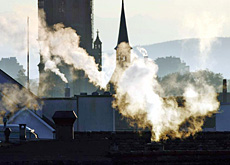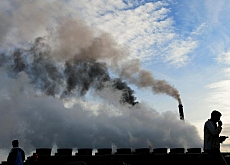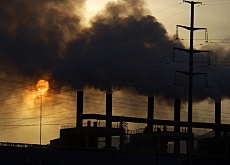Senate approves CO2 tax plan

A controversial tax on CO2 emissions, which is aimed at helping Switzerland reach its Kyoto Protocol target, has been approved by parliament.
But the Senate on Thursday opted for a more moderate levy than the government’s proposal.
Reducing levels of harmful carbon dioxide emissions is an integral part of Swiss climate policy. The government has adopted the Kyoto Protocol on reducing greenhouse gases, as well as a tough CO2 law.
The law stipulates that there should be a maximum levy of SFr210 ($174) per ton of CO2. The government wanted to introduce a flat rate of SFr35 per ton (nine centimes per litre of heating oil, and seven centimes per litre of natural gas).
But the Senate has followed the House of Representatives in deciding that the tax should come into force in stages and be dependent on pollution levels.
This would mean that from 2009 heating oil would be taxed by six centimes per litre and from 2010 by nine centimes per litre. It would be introduced if greenhouse emissions were not reduced by other means.
Obligations
“Switzerland can only fulfil its Kyoto Protocol obligations by using the House of Representatives model,” said senator Simonetta Sommaruga during the debate.
The Senate rejected a third proposal concerning CO2 in which the tax rate would depend on the price of heating oil.
Annual proceeds of the tax, estimated at over SFr600 million, are supposed to be redistributed to families and the economy through the benefit system.
The Swiss Property Owners Association said the decision lacked credibility and that heating oil users were being discriminated against. The association’s director Ansgar Gmür added that motor traffic, the biggest user of fossil fuels, was being protected.
The levy follows on from the so-called “climate cent”, a legally non-binding charge already levied on petrol and diesel imports at a rate of 1.5 centimes per litre.
The Swiss have long been proponents of the CO2 tax idea. Swiss President Moritz Leuenberger called for a global CO2 tax while at the recent international climate conference in Nairobi, Kenya.
swissinfo with agencies
The Kyoto Protocol, an amendment to the UN Convention on Climate Change, was approved in 1997 and came into force in 2005. It has been ratified by industrialised countries – apart from the United States and Australia – and by a large number of developing countries.
It calls for industrialised nations to reduce harmful emissions by an average of 5.2% below 1990 levels by 2012.
Switzerland’s CO2 law formally came into effect in 2000. Its objective is to reduce emissions of CO2 arising from fossil fuels by 10% from 1990 levels by 2010. The desired reduction should be achieved by voluntary measures, but if they are not adequate, the government can introduce a disincentive tax on fossil energy.
On November 8 the government declared that Switzerland had met its formal requirements under the Kyoto Protocol so that it would reduce its greenhouse gases by 8% below the 1990 level – or a maximum of 242.85 million tons of CO2 – between 2008 and 2012.
Carbon dioxide (CO2) is one of the major gases responsible for greenhouse effect and global warming. In Switzerland it represents around 80% of harmful emissions.
The other gases include methane, nitrous oxide and hydrocarbons.
Despite ambitious emission targets, greenhouse gas emissions have actually risen by 0.4% in Switzerland since 1990.

In compliance with the JTI standards
More: SWI swissinfo.ch certified by the Journalism Trust Initiative



You can find an overview of ongoing debates with our journalists here . Please join us!
If you want to start a conversation about a topic raised in this article or want to report factual errors, email us at english@swissinfo.ch.